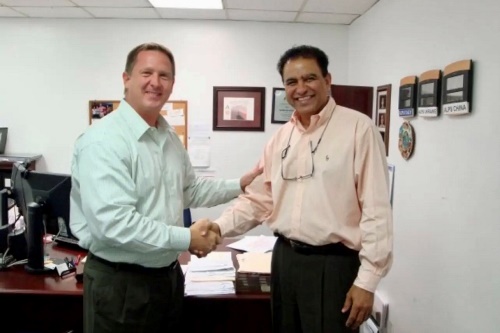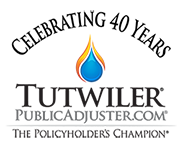You should demand a meeting with your professional public adjuster present to discuss this issue with the insurance company adjuster, and the salvage company people. Chances are the salvage company person already has a buyer and knows how much profit they will make. You need to know this as well in order to make an informed decision that protects your ability to be fairly paid under your insurance policy.

They gathered an excellent team of experts to help with the case and worked the claim with passion. We could not be more pleased with the experience we had and the result we got.
– Warehouse Owner
Understanding Commercial Property Damage Claims
Generally, commercial businesses have their own unique policies and endorsements that in some cases are structured for their specific needs. These policies are often referred to as “manuscript policies.” As a result, losses to a business can and often involve very significant issues and challenges that are time consuming and require a trained professional’s effort. Management’s first and most important job is to resume business operations and get the business up and running. A professional public adjuster should be retained at the very on-set of a loss allowing management to focus on issues that will restore the operations of the business.
Insurance companies typically have their most experienced claims adjusters working on commercial claims because they can be so complex. That could put you at a disadvantage if you do not have a public adjuster representing your best interest and helping you with your recovery decisions with issues such as damage mitigation and business interruption claims. While you are attending to getting your business operating, we are protecting the complicated issues surrounding your insurance claim.
Tutwiler & Associates handles commercial claims of all sizes for all types of industries including: business and industrial claims, state and municipal claims, hotels, educational institutions, hospitals, condominium associations, apartment complexes, industrial parks, retail stores, shopping centers, military defense contractors, production plants and factories, high rise office towers, professional offices for doctors, lawyers, and insurance professionals. The list can go on and on. Tutwiler and Associates has been retained in cases involving just about every type of commercial loss over the years. See examples of commercial claims we’ve handled:
For the most part commercial business and their management staff have a somewhat higher level of sophistication in insurance matters. Brokers are often retained to structure specific programs that cater to commercial business insurance needs. In larger corporations, it is not unusual to see in-house risk managers employed to keep track of insurance coverage given an ever changing risk profile due to new products or business plans. Risk manager’s responsibility can be as broad as to indentify and plan for all types of risk including property insurance, exposure for third party liability issues, and loss of income and business interruption coverage.
Our experience has been that when an insured suffers a loss, the first reaction is to notify the broker and/or risk manager so the claim can be reported. While brokers and risk managers should and do play an important part in the early phase of a claim, most would agree that they are not adjusters. So when there is a loss, someone still has to deal with the many details involved in actually adjusting and documenting the damage. This is where the public adjusters at Tutwiler and Associates are typically called upon to help.
It’s our view from years of experience that a commercial business who has the benefit of having a good broker or risk manager should add a professional public adjuster to the team. Teamwork with the client’s best interest as a priority is a model for the successful adjustment of a commercial loss.
The types and issues that come up in commercial loss are incalculable. As stated above, the types of policies and coverage vary, so each loss has its own unique problems that must be worked through. Over the years we have seen certain general practices and procedures that always seem to turn up in commercial claims that if not planned for and dealt with properly could create bad results.
As an example, co-insurance seems to be a widely misunderstood concept. In other countries where we have worked, this term is often referred to as an “Average” clause in property policies. Why do we have no insurance or average clauses in the United States? The insurance industry through actuarial science knows that most losses are not total losses, but in fact partial losses. It did not take the public long to learn this concept and as result an inequity resulted when two property owners with very similar buildings insured them for different amounts. The first owner insured for 100% of the value of his building while the second owner only insured for half. In a partial loss (that was less than half the value of the business) both parties were paid the same amount. To make this an even playing field, the insurance industry came up with a co-insurance concept where if you insured for an amount less than the value of your building you may have a penalty applied at the end of the adjustment process, or in other words you become a co-insurer of your loss. Most property policies have this math formula detailed in their policies. In general the policy amount is calculated as follows: Insurance amount carried ÷ insurance required (amount of value of your property at the time of the loss) X the co-insurance rate you selected (i.e. 80%) times the adjusted loss as negotiated with the insurance adjuster.
Applying co-insurance is an art form and depending on whose numbers are used, can make a significant difference in the outcome. Also, commercial losses are paid on the actual cash value of the claim amount, so any co-insurance calculation should be figured in actual cash values of the building which can make a big difference if an argument arises about a co-insurance penalty.
The deductible issues can also be confusing because most adjusters will apply the deductible to the payment they want to give you. Read your policy to determine if your deductible may be applied off the entire loss. This can make a big difference in the net payment you will receive.
Commercial losses typically are not total losses and while the stock and equipment cannot be sold as planned, they may have significant salvage value. If your insurance company pays you for the cost of damaged stock, does that give them the right to take the salvage, sell it and pocket the difference after the salvage company takes their cut? Not necessarily, as a number of issues are involved in this process. First, are your losses in excess of your coverage? If so, you may be entitled to salvage recovery money. Also an agreement needs to be reached between the insurance company, your professional public adjuster and the salvage company on what the net amount may be after cost. It’s important to know this number. Many claims have been settled where the insured is allowed to keep salvage as a trade-off for a somewhat reduced total loss payment.
If salvage is taken by a professional salvage company, make sure you know where the salvage is going to be sold. You don’t want it sold within your market at a reduced price. Some big chains with their own product lines will buy “brands and labels coverage” which is an endorsement that pays the additional cost to hand remove all labels from items so they cannot be associated with a store and devalue a chains product line and brand name.
These are just a few of the issues we have helped clients deal with. For over 27 years, businesses of all sizes and their risk managers have turned to or referred their colleagues to Tutwiler and Associates. As experienced public adjusters, we understand the claims process and have the resources and expertise to help you recover your claim. Our knowledge of the insurance policy, claims process and field experience have yielded us a longstanding positive reputation in the industry.
We pride ourselves on obtaining the maximum claims settlement under your policy provisions so you can be paid to recover as quickly as possible. If you would like help with your commercial or business insurance claim and understand your options, give us a call at 813-412-8357 or contact us.
FAQs About Commercial Claims
This is a case were you probably should show the person to the door. There is no requirement we are aware of to re-build in order to get paid. You may in fact not be allowed to re-build because of code and zoning issues. By not replacing your building, you may not get the replacement cost of your loss but instead receive an actual cash value payment which would be less. In some cases if you purchase another building, it may qualify you to get replacement cost even though it is at another location.
If you have stock that would normally be sold as new a (even though it may be cleaned) you cannot now sell it as new. Even in situations where a box that has a product inside is the only item damaged, there is still a loss that technically makes the whole product damaged. Cleaning equipment is one thing but damaged stock is another. Also be aware that smoke has an acid content that over time may rust internal parts of equipment. Getting smoke odors out of all the items that have been affected can be problematic. Give us a call we know the issues and how to push to make sure you are paid for your loss.
Business interruption coverage will pay for your loss income. Extra expense coverage can be used to pay for expense you incur to resume operations that will reduce your loss of income. This can be a very tricky and problematic area so you should seek guidance in this area. As example, you may incur many thousands of dollars in extra expense only to have the insurance company tell you your efforts did not reduce or eliminate their exposure to you for business interruption. In other words they require you to prove you spent the money to reduce your business interruption loss. Agreements between parties on the front-end and utilizing the expertise of a professional public adjuster can help avoid some of the unexpected consequences involved in business interruption and extra expense claims.

